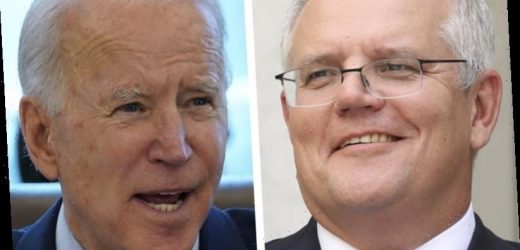Energy Minister Angus Taylor has declared Australia is “dead against” carbon tariffs as Prime Minister Scott Morrison awaits an invitation from United States President Joe Biden to climate talks in April.
The Sydney Morning Herald and The Age revealed on Thursday Australia would push back against Britain’s bid to use the G7 leaders’ summit in June to establish climate tariffs, arguing the sanctions would be a new form of protectionism designed to shield local industries from free trade.
Scott Morrison will be expected to travel to Washington, DC if the talks are held in person, potentially making his first meeting with US President Joe Biden on the fraught issue of climate change.Credit:Dominic Lorrimer, AP
Asked whether he opposed carbon tariffs, Mr Taylor said: “We have always been against tariffs in this country under this government.”
“We’ve actually made great gains in entering into free-trade agreements to eliminate tariffs,” Mr Taylor told Sky News on Thursday. “We are dead against tariffs and we believe in the role of trade in driving prosperity.”
“We will work with the United States, with Japan, with Korea, with the UK, with other countries around the world, to invest in the technologies that are really going to move the dial, because that’s how we reduce emissions without smashing our industries.”
Mr Biden will host a climate leaders’ summit on Earth Day, April 22, when he is likely to outline his carbon-reduction commitments under the Paris agreement.
“America must lead in the face of this existential threat. And just as with the pandemic, it requires global co-operation,” Mr Biden said last week.
The Biden administration has not yet said whether the summit will be held in person or online.
Mr Morrison would be expected to travel to Washington, DC if the talks were in person, potentially making his first meeting with the US President on the fraught issue of climate change, and raising the prospect of the Prime Minister doing 14 days’ quarantine shortly before the May budget.
Mr Morrison has been eyeing a more ambitious target of net-zero carbon emissions by 2050 despite unrest within the Nationals, but plans to push back on Britain and the European Union’s plan to impose carbon tariffs.
Australia’s ambassador to the US, Arthur Sinodinos, said on Thursday the Biden administration was “serious” about climate change, with plans for net-zero emissions by 2050 and decarbonising the power grid by 2035.
“Among his [Mr Biden’s] first executive orders have been a slew … to review things like oil and gas drilling on federal land, to start to implement new environmental regulations [and] reverse some measures from the previous administration which impacted on the ability to address climate change,” Mr Sinodinos said.
“What they’ve done is they’ve said ‘we will marry our infrastructure commitments with our clean energy targets’ … so they’re seeing it as both a job creation program as well as a clean energy program.”
Britain and the EU are looking to settle on plans to impose carbon tariffs in the coming months, while Mr Biden has pledged to implement a “carbon-adjustment fee” at the border. The move would establish levies on energy-intensive imports from carbon-price-free jurisdictions such as Australia.
The Morrison government will argue carbon tariffs are not aimed at combating climate change, but rather at economic objectives including protecting local industries such as British and European meat, cheese and wine.
A briefing prepared for the European Parliament found carbon tariffs would not amount to protectionism provided they did not discriminate against one particular country and were set at the correct rate.
Tony Wood, director of the Grattan Institute’s energy program, said the tariffs were actually about “levelling the playing field” and could encourage other countries such as Australia to boost their domestic climate policies.
“If the British government imposed a carbon price on their own producers and then imposed a border tax on overseas producers for the same thing – then it would give an incentive to countries which did not have a carbon price to do it,” Mr Wood said.
Opposition trade spokeswoman Madeleine King said Australia’s major trading partners were moving towards establishing climate border levies “aimed at countries like Australia that have weak climate change policies”.
“This government has its head in the sand about carbon borders. Our exporters, with the jobs they create, will pay the price,” Ms King said.
Start your day informed
Our Morning Edition newsletter is a curated guide to the most important and interesting stories, analysis and insights. Sign up to The Sydney Morning Herald’s newsletter here, The Age’s here, Brisbane Times’ here, and WAtoday’s here.
Most Viewed in Politics
Source: Read Full Article



